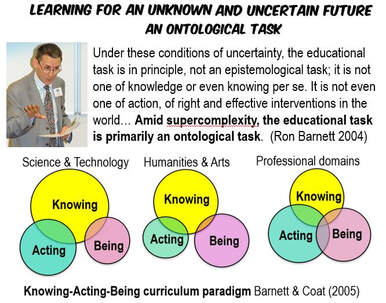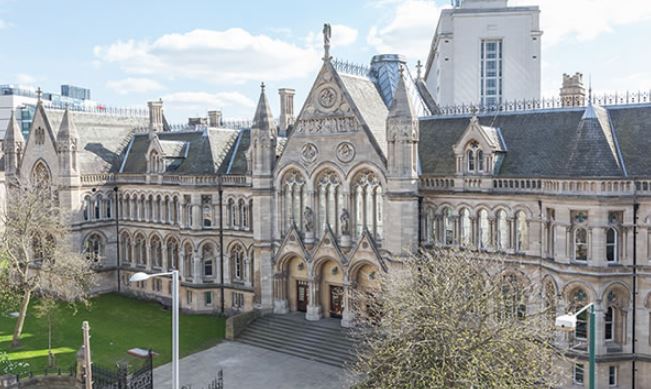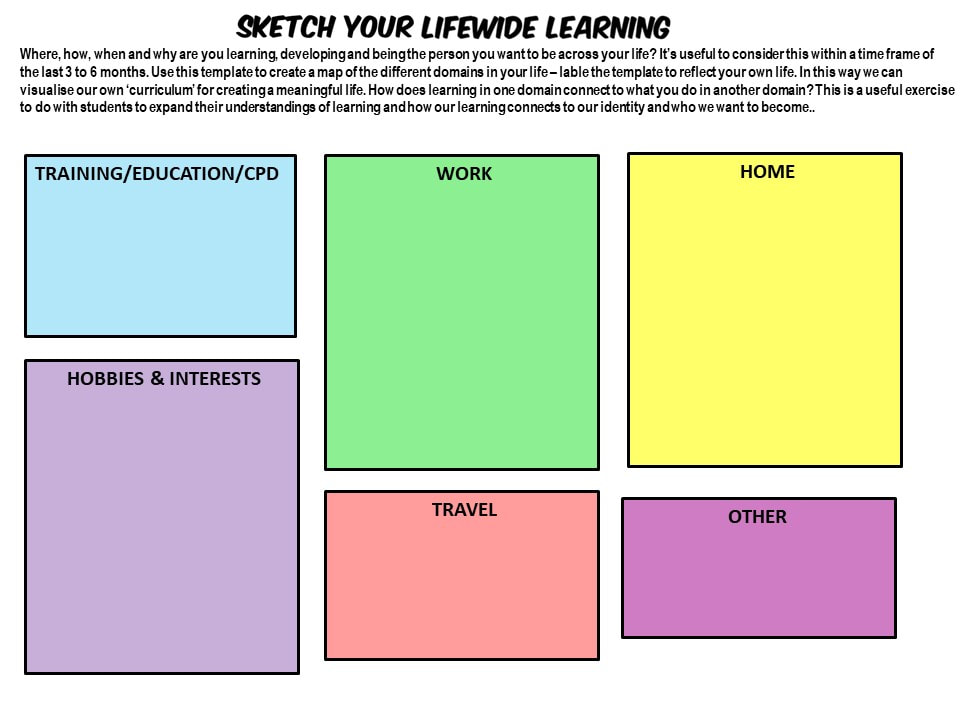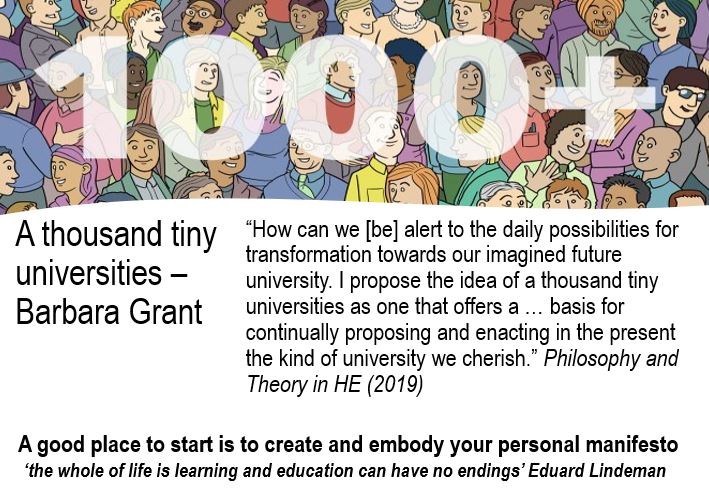The Wicked Challenge of Preparing Learners for a Lifetime of Learning
Lifewide and Ecological Perspectives on Learning, Teaching & Education
The contemporary world obliges human beings to learn and to keep on learning throughout their long lives in order to survive and flourish. The challenge facing educators and educational institutions all over the world is twofold, how do we prepare people for the enormous challenge of learning through the change, uncertainty and disruption they will inevitably encounter? and how do we support people throughout their long learning lives as new needs and ambitions arise?
I will focus on the first of these questions as it lays the foundation for the second. There are no right or wrong answers only a multitude of possibilities that learners, educators, institutions and society must choose from. I will argue that what lifelong learning means to us only emerges through the twists and turns of our unique histories and unfolding life, but that our lifelong learning is present now in the horizontal dimension of our life. We can encourage learners who are studying in higher education to appreciate the meaning of lifelong learning by enabling them to become more aware of their learning, development and achievements in the lifewide dimension of their lives.
I will also argue that learning and practice are ecological in nature and higher education teachers create ecologies within which their students learn. But the key educational task for universities is to encourage and enable learners to create their own ecologies for learning because survival in the world of social practice outside higher education depends on this capability. I will apply these ways of thinking to higher education teaching and to the experiences that learners create for themselves.
Slides and accompanying narrative
Lifewide and Ecological Perspectives on Learning, Teaching & Education
The contemporary world obliges human beings to learn and to keep on learning throughout their long lives in order to survive and flourish. The challenge facing educators and educational institutions all over the world is twofold, how do we prepare people for the enormous challenge of learning through the change, uncertainty and disruption they will inevitably encounter? and how do we support people throughout their long learning lives as new needs and ambitions arise?
I will focus on the first of these questions as it lays the foundation for the second. There are no right or wrong answers only a multitude of possibilities that learners, educators, institutions and society must choose from. I will argue that what lifelong learning means to us only emerges through the twists and turns of our unique histories and unfolding life, but that our lifelong learning is present now in the horizontal dimension of our life. We can encourage learners who are studying in higher education to appreciate the meaning of lifelong learning by enabling them to become more aware of their learning, development and achievements in the lifewide dimension of their lives.
I will also argue that learning and practice are ecological in nature and higher education teachers create ecologies within which their students learn. But the key educational task for universities is to encourage and enable learners to create their own ecologies for learning because survival in the world of social practice outside higher education depends on this capability. I will apply these ways of thinking to higher education teaching and to the experiences that learners create for themselves.
Slides and accompanying narrative
|
| ||||||||||||

Learning for an Unknown Future
Ron Barnett argues that rather than a knowledge or skill-based curriculum we need a curriculum that also engages deeply with the ontological dimension of being human, of being human in a world of great uncertainty that is constantly reforming, and of undergoing – of becoming different as we engage with this constantly emerging world. His argument provides a philosphical foundation for the idea of 'pedagogy for fulture learning'.
Ronald Barnett (2004) Learning for an unknown future. Higher Education Research and Development v23 #3 247-260 Available at:
https://admin.hv.se/globalassets/dokument/stodja/paper-theme-2-5.pdf
Ron Barnett argues that rather than a knowledge or skill-based curriculum we need a curriculum that also engages deeply with the ontological dimension of being human, of being human in a world of great uncertainty that is constantly reforming, and of undergoing – of becoming different as we engage with this constantly emerging world. His argument provides a philosphical foundation for the idea of 'pedagogy for fulture learning'.
Ronald Barnett (2004) Learning for an unknown future. Higher Education Research and Development v23 #3 247-260 Available at:
https://admin.hv.se/globalassets/dokument/stodja/paper-theme-2-5.pdf
|

|
What is your lifelong learning trajectory? The Danish philosopher Søren Kierkegaard once said 'Life can only be understood backwards; but it must be lived forwards'. Steve Jobs expressed the same idea in a different way 'you can’t connect the dots looking forward; you can only connect them looking backwards. So you have to trust that the dots will somehow connect in your future.' If you have a few minutes it is worth spending the time to connect up the dots of your learning life. Here is a simple exercise you can do to reveal to yourself the nature of your own lifelong learning. DOWNLOAD THE TEMPLATE
| ||||||
|
|
What is the nature of your lifewide learning?
Lifewide learning adds important detail to the broad pattern of human development by recognising that most people, no matter what their age or circumstances, simultaneously inhabit a number of different spaces - like work or education, being a member of a family, being involved clubs or societies, travelling and taking holidays and looking after their own wellbeing mentally, physically and spiritually. So the timeframes of lifelong learning and the multiple spaces of lifewide learning will characteristically intermingle and who we are and who we are becoming are the consequences of this intermingling. You can use this template to develop a deeper understanding of the nature of your everyday learning and development in the different spaces that make up your life. DOWNLOAD THE TEMPLATE
| ||||||
|
TOWARDS A PERSONAL MANIFESTO FOR LIFELONG/LIFEWIDE LEARNING
Ghandi argued ontologically that we have to be [become] the change we want to see in the world and I would like to connect this thought to another proposed by Barbara Grant that we can all be our own university if we want to be. We are all able to contribute to shaping the sort of education we believe is right for the development of our students – now in the present but also mindful of their future. Perhaps the place to start is for each of us to develop our own manifesto setting out the type of learning experiences we want to enable in order to make an enduring difference to the lives of our learners. MY MANIFESTO
| |||||||
More resources about lifewide learning can be found at:
LIFEWIDE EDUCATION http://www.lifewideeducation.uk/
LIFEWIDE DEVELOPMENT AWARD http://www.lifewideaward.com/
CREATIVE ACADEMIC http://www.creativeacademic.uk/
Kerri Facer shares her insights on the future world our students will inhabit


